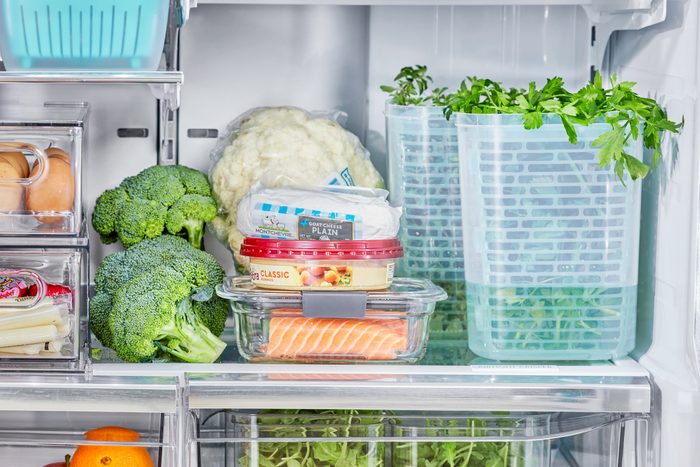
You’re tired. And hungry. This is never a fun combination. Heating up a frozen dinner is simple, but maybe a little uninspiring. Grabbing takeout sounds fun, but you just did that—plus, you know the drill about sodium and saturated fat on most menus.
Dr. Elizabeth Klodas, MD, a cardiologist in Minneapolis, MN, highlights a point that might hit home for you: the way we eat is pretty habitual…especially when we’re low on time and energy. “It’s really helpful to have food that you know builds health and to be surrounded by it in your environment,” she says. “By changing what we eat, we can change our health trajectory.”
Get The Healthy @Reader’s Digest newsletter
Dr. Klodas is the chief medical officer and founder of Step One Foods, which describes itself as “a food company helping patients make dietary changes to reduce their dependence on medication.” She’s authored multiple scientific articles as well as a book, Slay the Giant: The Power of Prevention in Defeating Heart Disease, and also served as founding editor-in-chief of the patient education effort of the American College of Cardiology. One prevailing lesson from all her years studying heart health? “Eighty percent of heart disease is preventable … Nutrition has a huge impact on heart health.”
So what are the best foods for your heart? Here, Dr. Klodas offers a glimpse inside her own kitchen to show us what she eats, based on what she knows about the link between food and cardiac wellness.
Exactly How to Stock Your Fridge If You Want Your Food to Last
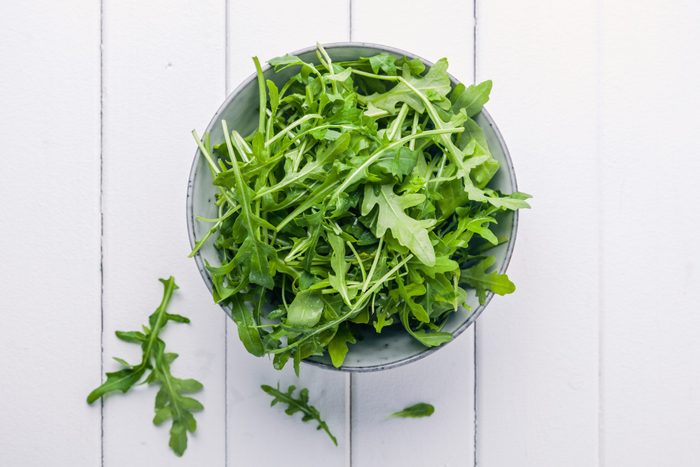
Salad greens, especially arugula
Dr. Klodas tells us, “Salad greens are a high-[nutrient]-volume, low-calorie food and have antioxidants.” (Antioxidants are components in natural foods that help the body resist cell damage.) “Arugula is my favorite, so it’s always in my fridge.”
Why that’s big: arugula is loaded with vitamin C, folate, and potassium, “and assists with cardiovascular health.” Dr. Klodas says she loves the peppery taste and often makes a salad with these greens.
3 Healthy Salad Dressing Recipes This Nutritionist Swears By
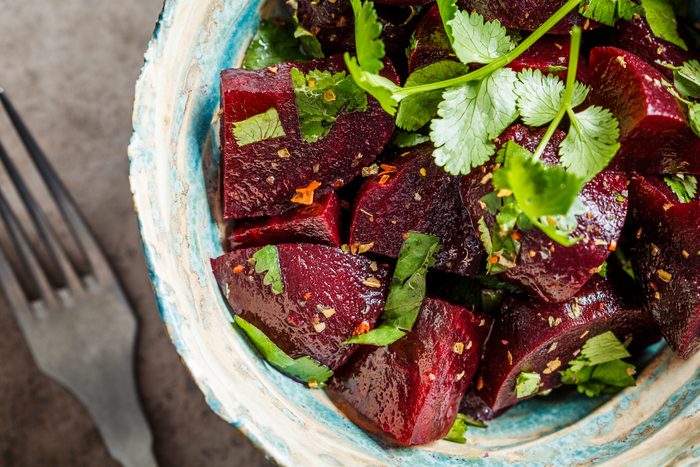
Ready-to-eat roasted beets
“Roasted beets have components to lower blood pressure,” she says. Beets are a source of nitrate, which increase blood flow when the body converts to nitric oxide. Plus, beets are loaded with fiber and antioxidants.
Dr. Klodas shares that her favorite way to eat this root vegetable is on top of her arugula salad, or sliced up and topped with goat cheese, lemon juice and olive oil. (Mouth watering yet?)
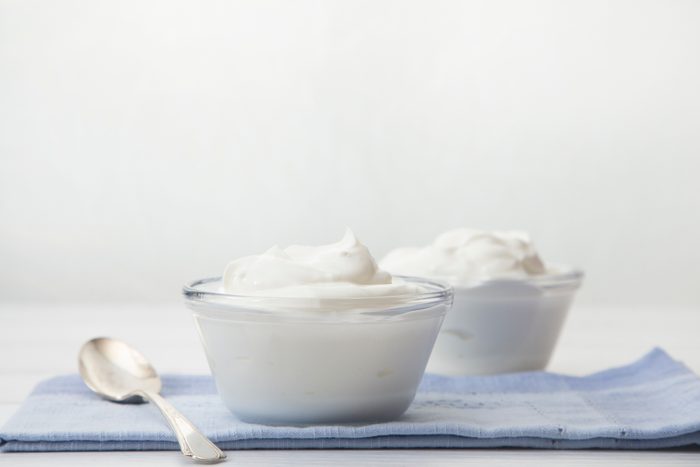
0% Fat or Low-fat plain Greek yogurt
“Yogurt is a source of probiotics for health, and the microbiome is important for cardiovascular health and also regulates insulin sensitivity,” Dr. Klodas explains. She eats yogurt almost every day for breakfast—”Yogurt is also a great source of protein and calcium.”
Here’s How Much Protein You Really Need in a Day, with a Kidney Doctor’s Wisdom
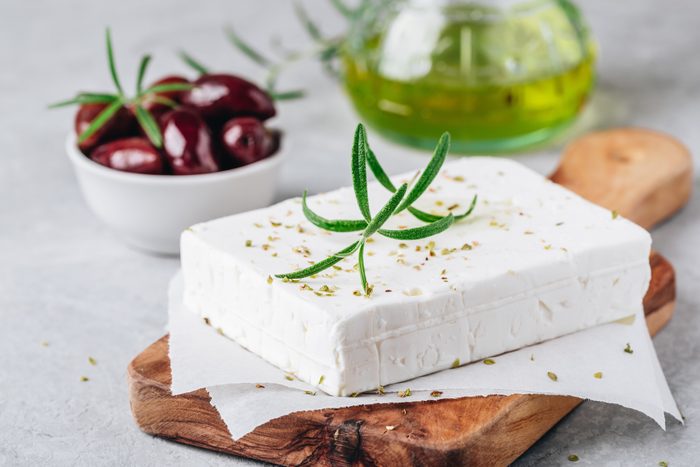
Goat and feta cheese
Dr. Klodas says she likes to sprinkle goat cheese on her salads for a little extra texture. Goat cheese has less saturated fat and is lower in sodium than many other cheeses—both good characteristics for the heart. Minerals like copper and magnesium are in higher proportions with goat cheese in comparison to cow’s milk.
Feta’s another favorite salad-topper of this cardiologist, though it tends to have a high sodium content. So, Dr. Klodas says, while she enjoys it, she eats feta a little less often.
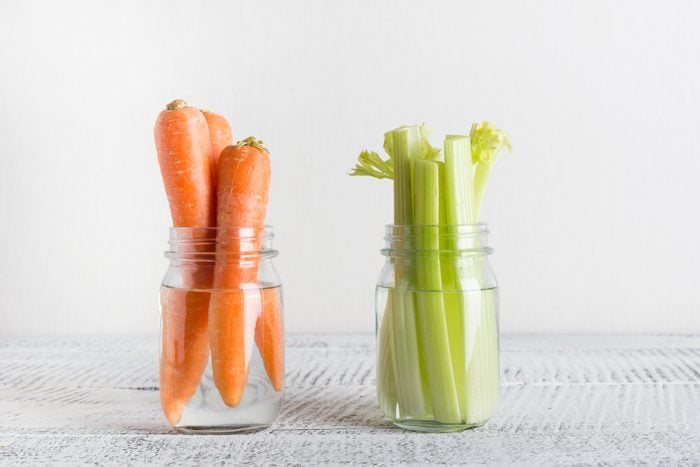
Carrots and celery
Dr. Klodas always keeps carrots and celery on hand because they’re great to eat with hummus or toss into soups, which she says she loves to make to pack in veggies and whole grains (like barley) into her diet. “Carrots have vitamin A and antioxidants,” she says, “and celery is a low-calorie, high-fiber vegetable that is full of antioxidants and potassium.”
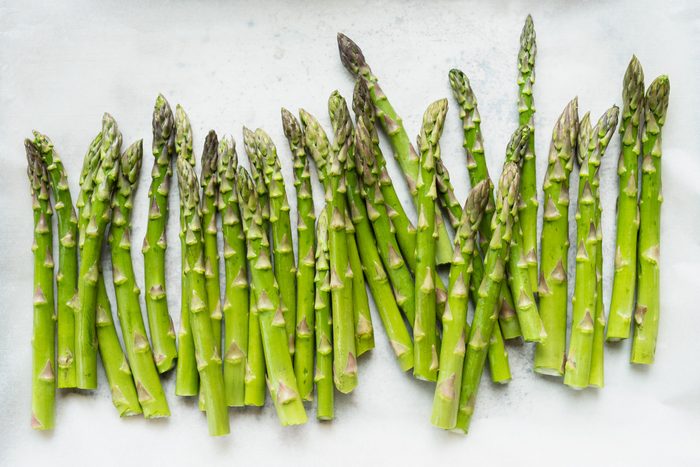
Cauliflower, broccoli and asparagus
Dr. Klodas says brassicas, such as broccoli and cauliflower, have high levels of plant sterols—compounds that help the body block absorption of LDL (bad) cholesterol and therefore help reduce harmful cholesterol. “Eating more plants helps lower cholesterol,” she says. And yes, on average, “Plant-based eaters have lower cholesterol.”
Although asparagus isn’t a brassica, this vegetable also helps remove cholesterol before the body absorbs it. Dr. Klodas says roasting or charring asparagus over a grill is one of her favorite ways to prepare it. To dress this go-to side, she drizzles a little olive oil and lemon juice.
The Best and Worst Diets for Your Cholesterol, Says UCLA Cardiologist
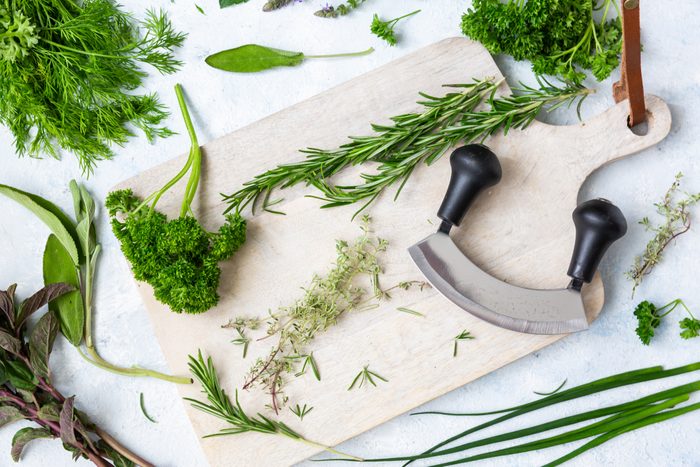
Herbs: cilantro, dill, rosemary, thyme
“Herbs are a great way to add flavor without adding sodium,” Dr Klodas says. Herbs are high in antioxidants and contain a high concentration of plant oils. This heart doctor is a fan of cilantro and loves tossing it in salads with avocado and in bean stews. She loves to add rosemary or dill to potatoes.
Dr. Klodas’s tip to make fresh herbs last longer: she washes and trims them, then dries them and spreads them out over a big paper towel. Then she rolls the paper towel like a jelly roll and keeps them in the fridge. Stored like this, herbs will last one to two weeks instead of wilting in a day or two.
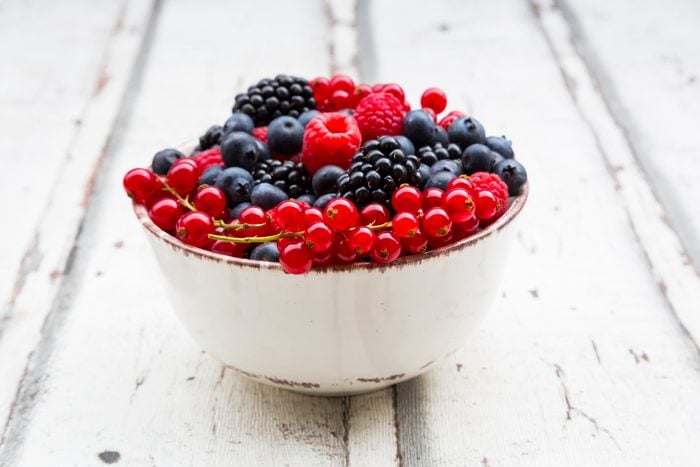
Berries
Berries are heart-healthy fruits and are loaded with antioxidants. She loves raspberries, blueberries and strawberries and typically has all three types in her fridge.
This cardiologist tops her yogurt bowl with raspberries and blueberries, along with chia and flaxseed for a filling breakfast that keeps her full all morning.
She buys strawberries when they’re in season and loves them for a simple dessert, sliced up and sprinkled with less than a teaspoon of sugar to heighten the flavor.
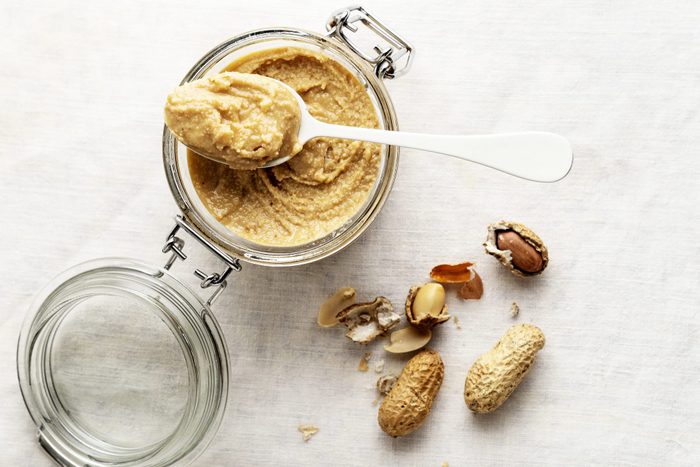
Peanut butter
Some of the benefits of peanut butter is that it’s high in protein and monounsaturated fats (which can help lower LDL cholesterol), plus contains vitamin E and antioxidants, Dr. Klodas explains.
She always buys roasted, unsalted, unsweetened—and she likes the chunky type. Smearing on toast or dipping with celery sticks are her faves.
Eating This Nut Will Help Your Gut and Reduce Inflammation, New Study Says
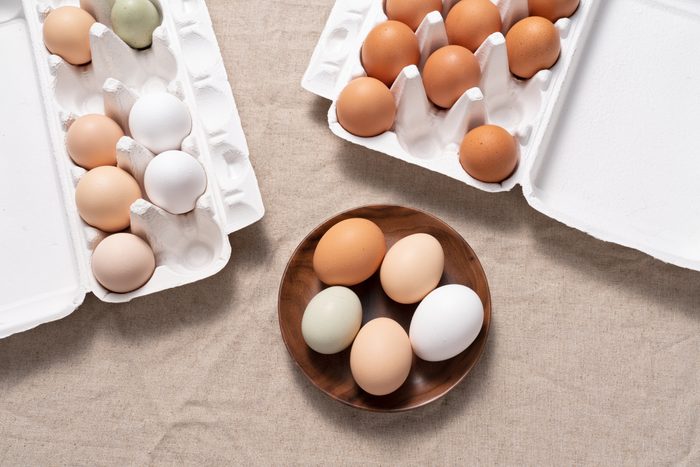
Eggs
This cardiologist believes eggs have been “unfairly maligned.” An average egg, she says, will have 200 milligrams of cholesterol—but “all in the yolk, not in the white part.”
“Eggs support life and are a complete protein,” she adds, plus vitamin A, D and B12. Dr. Klodas suggests that an egg a day is usually fine. (She consumes on average two to three eggs a week.)
Eggs have the essential nutrient choline, which helps with brain function and the nervous system.
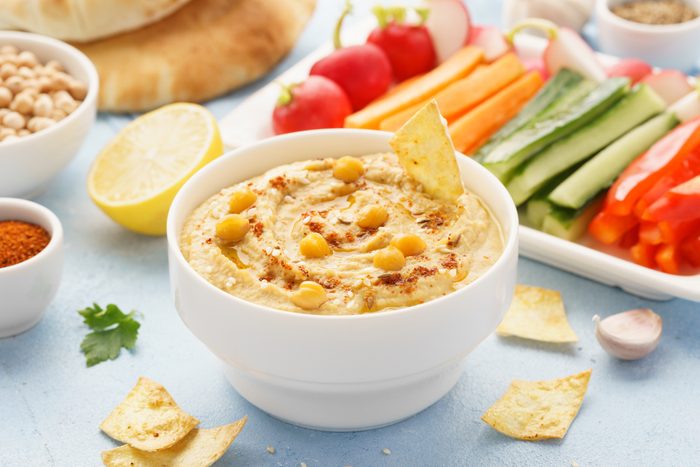
Hummus
Hummus is a dip made from chickpeas, a type of legume. “Legumes are full of fiber and protein,” she says, while hummus in particular “has iron, folate, zinc, potassium and lowers LDL and improves blood sugar.” (As if you didn’t love it already!)
For a heart-healthy snack, Dr. Klodas loves to dip carrots and celery slices in hers.
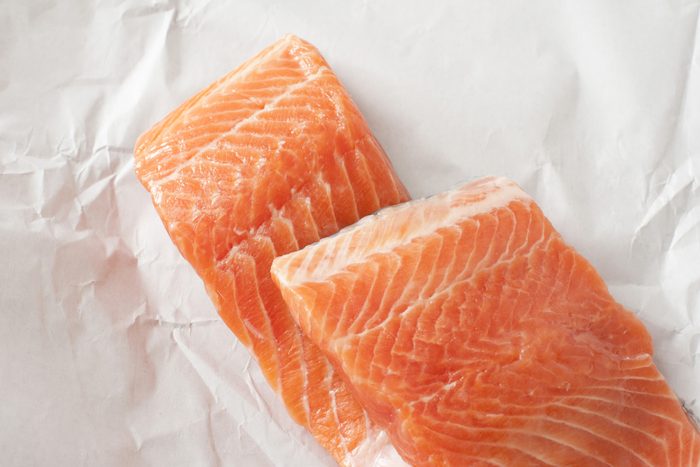
Salmon
“I love salmon,” Dr. Klodas says, including smoked. “Salmon is high in Omega-3 fatty acids as a marine source,” she explains. “Salmon lowers LDL (bad) cholesterol, increases good cholesterol (HDL) and lowers triglycerides.” Plus, this fish is anti-inflammatory.
How Long Does Fish Last in the Fridge?
For more wellness updates, follow The Healthy on Facebook, Instagram, and Twitter. Keep reading:
- What Are the Best Foods to Fight Cancer? Here’s What’s in a Cancer Dietitian’s Fridge
- Eating This Nut Will Help Your Gut and Reduce Inflammation, New Study Says
- Duchess Meghan Markle’s 11 Quiet Habits That Help Her “Survive and Thrive” in Royal Life
- Can’t Sleep? A New Study Found This Solution Was More Powerful Than Melatonin
Editor’s Note: The Healthy @Reader’s Digest’s Medical Review Board member Latoya Julce notes, “Like other dairy products, Greek yogurt contains natural hormones, which can be harmful to people with hormonal imbalances. The pasteurized and homogenized milk used in the yogurt can lead to histamine problems such as acne and eczema, as well as gastrointestinal problems for some people. Milk and other dairy products are the top source of saturated fat in the American diet, contributing to heart disease, type 2 diabetes, and Alzheimer’s disease. Studies have also linked dairy to an increased risk of breast, ovarian, and prostate cancers.”

